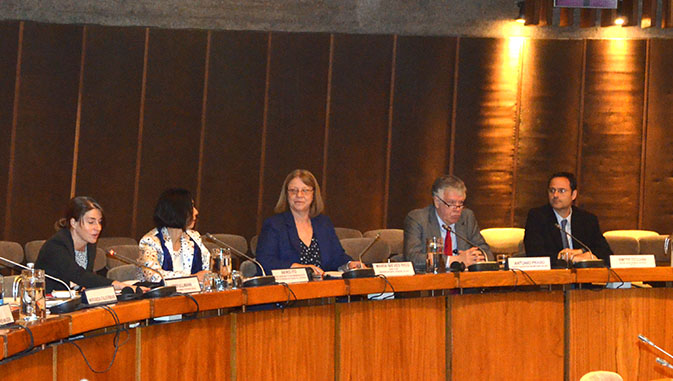News
A set of recommendations aimed at amplifying the voices of women with disabilities and promoting their inclusive development with gender equality was unveiled today at the conclusion of a meeting of specialists that began on Tuesday, November 15, 2016 at the headquarters of the Economic Commission for Latin America and the Caribbean (ECLAC) in Santiago, Chile.
The gathering, entitled the Expert Group Meeting Advancing the Rights and Perspectives of Women and Girls with Disabilities in Development and Society, was organized by ECLAC and the United Nations Department of Economic and Social Affairs (UN DESA).
At the opening session, the speakers included Antonio Prado, ECLAC’s Deputy Executive Secretary; María Nieves Rico, Director of the Gender Affairs Division; Simone Cecchini, Social Affairs Officer from the Social Development Division; and Akiko Ito, Chief of the Secretariat for the Convention on the Rights of Persons with Disabilities within DESA.
The three-day meeting brought together international specialists on issues of gender equality, disability and development, coming from academia, governments, non-governmental organizations, organizations of women with disabilities and the private sector.
Women and girls with disabilities continue to be disempowered across the world, the group warned, calling on all actors to raise awareness and break down stereotypes and stigma to support acceptance and understanding of diversity.
To this end, the production of quantitative and qualitative data on girls and women with disabilities must be strengthened in order to follow up on the implementation of the Sustainable Development Goals (SDGs) of the new 2030 Agenda, the participants agreed.
The specialists recommended bolstering capacities at national statistics offices to support the collection, reporting, analysis and use of internationally comparable data disaggregated by sex and disability. They also called for improving coordination and collaboration between public divisions involved in data collection and policy development.
Governments must urgently take affirmative action measures to support the participation of girls and women with disabilities in countries’ political, social, economic and cultural spheres, the group stated. A concrete example would be the establishment of quotas for political representation and employment opportunities in public and private institutions.
They also called on non-governmental organizations to create mentorship and leadership programmes at the grassroots level to spur the development of young leaders. The experts said that governments should not only provide resources to finance these kinds of programs but should also systematically include girls and women with disabilities in official delegations to forums and conferences, as well as sponsor their participation in national and international gatherings of interest.
At the event’s opening session, Antonio Prado recalled that “in Latin America and the Caribbean, the prevalence of disabilities is greater among women than men.” The senior representative said “evidence indicates that one out of every five women has some disability,” adding that “the region’s high levels of economic and social inequality marginalize and exclude girls and women with disabilities, particularly those belonging to indigenous and Afro-descendant groups or living in rural areas.”
Some of the specialists present at the meeting included Claudia Pascual, Chile’s Minister of Women and Gender Equity; Daniel Concha, Director of Chile’s National Disability Service (SENADIS); Heba Hagrass, a Member of Parliament and President of Egypt’s National Council for Disability Affairs; Gabriela Troiano, an Argentine Congresswoman; and María Soledad Cisternas, Chair of the United Nations Committee on the Rights of Persons with Disabilities.
Minister Claudia Pascual referred to the Chilean government’s efforts to strengthen the recognition of diversity among women, including those who have a disability, and presented details from the working group that seeks to protect the dignity of this population group and incorporate new approaches to guarantee their sexual and reproductive rights.
Meanwhile, María Soledad Cisternas posed that “now is the time for the women’s movement to commit to increasing the visibility of and promoting and defending the rights of women and girls with disabilities.” She also indicated that “the international system of human rights promotion and protection is sending clear signals about expanding in a cross-cutting way the human rights model of persons with disabilities, which includes women and girls. This involves the link between rights and sustainable development, in accordance with the 2030 Agenda.”
The conclusions and recommendations emanating from the meeting in Santiago will contribute to the work of the United Nations and the next report by the Secretary-General on the situation of women and girls with disabilities, which will be presented during the 72nd session of the General Assembly (2017).



